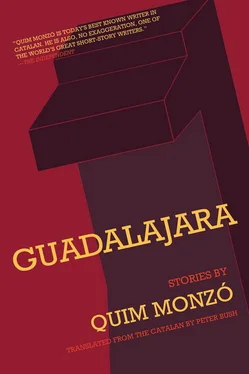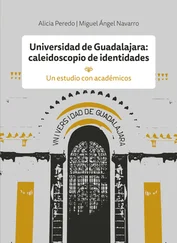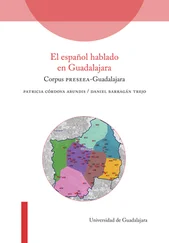Quim Monzó - Guadalajara
Здесь есть возможность читать онлайн «Quim Monzó - Guadalajara» весь текст электронной книги совершенно бесплатно (целиком полную версию без сокращений). В некоторых случаях можно слушать аудио, скачать через торрент в формате fb2 и присутствует краткое содержание. Год выпуска: 2011, Издательство: Open Letter, Жанр: Современная проза, на английском языке. Описание произведения, (предисловие) а так же отзывы посетителей доступны на портале библиотеки ЛибКат.
- Название:Guadalajara
- Автор:
- Издательство:Open Letter
- Жанр:
- Год:2011
- ISBN:нет данных
- Рейтинг книги:3 / 5. Голосов: 1
-
Избранное:Добавить в избранное
- Отзывы:
-
Ваша оценка:
- 60
- 1
- 2
- 3
- 4
- 5
Guadalajara: краткое содержание, описание и аннотация
Предлагаем к чтению аннотацию, описание, краткое содержание или предисловие (зависит от того, что написал сам автор книги «Guadalajara»). Если вы не нашли необходимую информацию о книге — напишите в комментариях, мы постараемся отыскать её.
Guadalajara — читать онлайн бесплатно полную книгу (весь текст) целиком
Ниже представлен текст книги, разбитый по страницам. Система сохранения места последней прочитанной страницы, позволяет с удобством читать онлайн бесплатно книгу «Guadalajara», без необходимости каждый раз заново искать на чём Вы остановились. Поставьте закладку, и сможете в любой момент перейти на страницу, на которой закончили чтение.
Интервал:
Закладка:
A year and a half later, also in the early morning, he sees (for tenths of a second, also with trumpets blasting) a terrible epidemic that in a matter of weeks ravages a country he can’t identify (he thinks it’s in Asia). He immediately speaks to the health authorities, so as not to repeat his negligence over his vision of the Paris earthquake. He tells them about the precedent of his father, how he foresaw the Paris earthquake, and how that tragedy took place because he’d said nothing. They say thank you very much and take notes, but he knows they’re only humoring him; basically they don’t believe a word.
A week later, the newspapers are filled with nothing else but reports of mortality rates in Laos and Cambodia. Ninety-eight percent of the population of Laos and twenty per cent of Cambodia’s have already died. Months later, by the time the epidemic is under control, Laos, Cambodia, and half of Thailand have been devastated.
A year after, he wakes up one morning and (the same few tenths of a second and usual trumpet blasts) sees a school bus tumbling off of a cliff. He knows which school it is because the name’s written in large spindly letters across the top of the windshield. He rushes off to talk to the school’s headmaster. He describes his vision: the bus, the road, and the bend with the ravine. The headmaster is impressed; the bus always drives along the road he saw in his dream, and around the bend with the drop into a ravine. He calls the driver in and tells him. When the prophet’s son sees him (a prophet now, indeed, on his own merits), he whistles. It’s the man who is driving the bus when it tumbles into the ravine. The headmaster is really impressed yet again, and very grateful. But on which day did it happen? The prophet can’t say for sure. The headmaster takes a decision: the bus will follow an alternative route for a time, and a new driver will replace the usual one.
Two months later, as the predicted calamity hasn’t happened, the usual driver returns, but as a precaution, he will follow the alternative route. After six months, given it is impossible to continue taking the much longer, costlier route, he returns to the traditional one. When he is close to the bend by the ravine, the driver takes even more care than usual. Weeks and months pass without any problems. At the very beginning of June, the bus hurtles into the ravine.
People look at him maliciously, as if he were in some way guilty. One evening, the police had to stop the relatives of the dead children from lynching him. The prophet tells them time and again that they are confusing prophesying an event with causing it. The headmaster agrees. And he too feels vaguely, unjustifiably guilty. What should he have done? Change the route for all time? Fire the driver without good reason? Nothing tangible indicated that the accident was inevitable.
The prophet reproaches himself. Months later, one morning when the trumpets and dazzling lights reveal to him that the British Air-ways flight 5397 from Barcelona to Birmingham will crash, he decides to say nothing. However much they try to stop it, the accident is bound to take place. If he predicts it, people will think he is in good measure responsible. But he finds it difficult to have that knowledge and keep it to himself. Besides, in this case, the solution seems simple enough. If the Barcelona-Birmingham flight that is going to crash is the 5397, all they have to do is change the number 5397 and give the flight a number than nobody uses (for example, 7612): numbers can’t be in short supply. However, is it possible to short-circuit a prediction? He can’t sleep knowing deaths could be avoided by taking such a simple step as changing the flight number. If the company would listen to him, the problem would be solved. He informs the company, tells them his record of prophecies and the vision he has had about flight 5397. The directors of the company give him a pleasant welcome and tell him that if they paid attention to everyone who claimed they had a presentiment that such and such a flight will be involved in an accident, they wouldn’t be able to fly anywhere. Years ago they took the decision to ignore them systematically.
Now that the situation is out in the open, the prophet tells a newspaper (the only daily, a sensationalist rag, that will listen) what has happened, his record of prophecies and the precedent of his father, and warns that, if the company persists in ignoring him, the 5397 flight from Barcelona to Birmingham is going to have an accident. The daily, it’s short on space, publishes the news (bottom half of the left-hand page) and calls the prophet a half-mad lunatic. When the plane crashes three days later, the disaster brings him public recognition. Opinion champions him and turns against the air company. How could they have scorned a prediction that was so clear, that would have made the accident so easy to avoid? The newspapers that hadn’t showed the slightest interest in his story before the crash now want to interview him. In every single interview, the final question is about whether he has new predictions to make. A journalist on the country’s second most important daily makes fun of the fact that people keep talking about prophecies when it is obvious they are simply visions. A prophecy is much more elevated and transcendent. The prophet emphasizes that the importance of what is being revealed to him doesn’t warrant any divisive pigeonholing. It is no less crucial if it is of worldwide or simply individual interest: it is a revelation of a future event, and this is all that matters. Indeed, perhaps his father never remembered his revelations because he persisted in trying to discern something that was universally valuable, an element of redemption.
The prophet is now so famous that when he has his next revelation (that a particular cruiser on a Christmas cruise around the islands of the Aegean is going to sink), the authorities decide to believe him. They don’t cancel the cruise, but they don’t allow any passengers on board. And when the vessel shipwrecks, it does so in the glare of television cameras that are broadcasting every moment of the ship sinking and the rescue of the crew by helicopters that were accompanying the ship expressly for that purpose. Immediately afterwards, he prophesies a new war between two countries in South America, but not even the big powers can do anything to prevent that, and war breaks out. He predicts a tsunami that will bring destruction to Chile, Hawaii, and Japan. He predicts trains will collide near Bologna and the imminent death of the king of Norway. When he foresees the eruption of a volcano near the island of Mexcala, in Lake Chapala, the authorities quickly evacuate the area and the loss of human life is nil, although nearby villages are devastated by the lava. He’s now being asked to predict everything: if such a day would be good for elections, if such a place is ideal for building a new airport, what the future holds for such and such a prime minister. He feels he is being treated like an oracle. People stop him in the street and ask him what the weather’s going to be like on the weekend or the number that’s going to win the next lottery. Time and again he has to make it clear that he knows nothing about most things, that he can only prophesy what has been revealed to him. The journalists who imagine him making predictions à la carte find this most disappointing.
When a bomb explodes in the train station for the Berlin zoo (seventy-nine fatalities), the news is on every front page and all eyes are turned on him. Why didn’t he foresee it? Once again, he has to remind people that he has no power over which events will be revealed to him and which won’t, and no way of intuiting beyond what he is shown in the revelation. Nevertheless, however often he tells people, from then on, some individuals (including the journalist who believes he is more a visionary than a prophet) reproach him for every event he doesn’t predict, particularly if it’s a catastrophe. “Perhaps we shall never know what his hidden reasons for not predicting this event were,” one article on the bombing of the Berlin station concluded, almost accusing him of conniving with the terrorists. The headline was: “A prophet when it suits.”
Читать дальшеИнтервал:
Закладка:
Похожие книги на «Guadalajara»
Представляем Вашему вниманию похожие книги на «Guadalajara» списком для выбора. Мы отобрали схожую по названию и смыслу литературу в надежде предоставить читателям больше вариантов отыскать новые, интересные, ещё непрочитанные произведения.
Обсуждение, отзывы о книге «Guadalajara» и просто собственные мнения читателей. Оставьте ваши комментарии, напишите, что Вы думаете о произведении, его смысле или главных героях. Укажите что конкретно понравилось, а что нет, и почему Вы так считаете.












